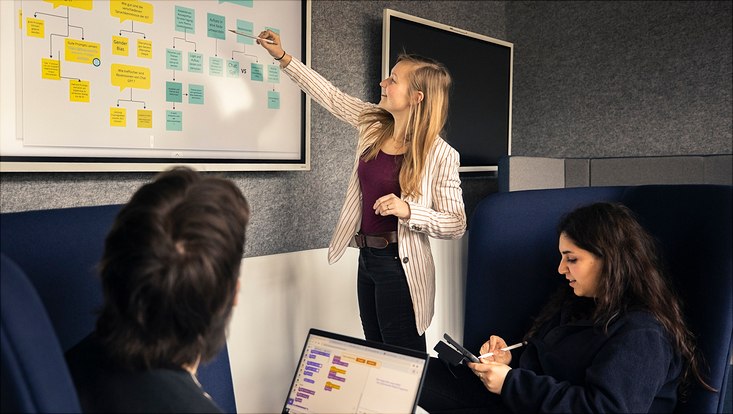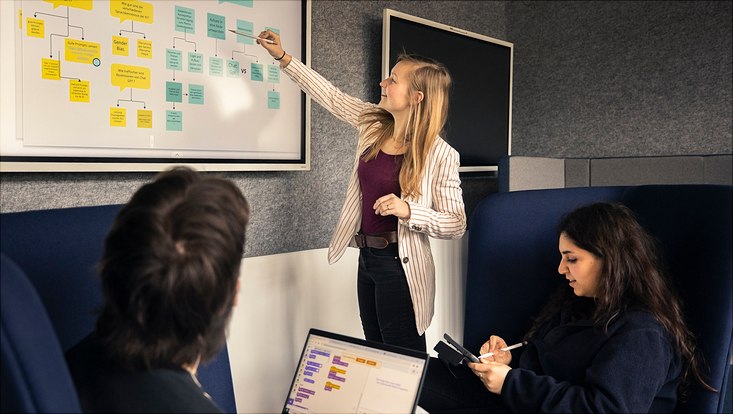Cultural Shift at the University: Small Projects, Great Impact
12 December 2024, by Anna Priebe

Photo: University of Hamburg/Esfandiari
How can we work together better and more positively and effectively communicate? From new formats to momentary adjustments—there are a host of ideas for greater scientific exchange and working together successfully. This series present inspiring initiatives.
The sync method for shorter, more efficient meetings
Sabrina Fuhrmann, Smart Administration Unit
“Seeds”—small measures for quick changes—is a way to optimize your own working environment easily. Due to the sheer number of meetings, we in the Culture and Vision project thought meetings, among other things, would be a good starting point. Who hasn’t sat in a meeting that went on forever, in which discussions were endless, and asked themselves why they are even there?
As we became familiar with the sync meeting method, it was immediately clear to me that I wanted to try this in my team. Basically, it’s about set categories and structures: Moderating and documenting roles are always assigned anew. After a “check-in” and brief updates on the project in question or a current project, we focus on the so-called action points. Those are current ideas, plans, wishes, or problems that all participants have raised before or during the meeting, combined with goals, for example, whether information should be shared or a concrete task needs to be completed. The goal is for all participants to get what they need for their work. The people involved work on concrete solutions in follow-up meetings.
Individual components can be adjusted depending on the purpose of the meeting but the main idea is that all participants have a role and are involved. It ensures focus when everyone is prepared and organized for the meeting. At the beginning, it took some getting used to because a good moderator intervenes immediately when old patterns emerge and the discussion wanders off-topic. But our meetings have become notably more efficient in the half year since we have been using the sync approach. For a meeting with 10 people, we now often need less than 50 minutes rather than 1.5 hours. And the best thing is, everyone now finds the meetings useful and productive. There is no more time-wasting and real progress!
Quick improvements and greater understanding—the 3x3 of improvement
Stefanie Krüger (Faculty of Law), Dennis Scheffran (Faculty of Business, Economics and Social Sciences), and Christina Semke (Department 7: Finance and Accounting)
Whether faculty administration or University Administration, all of us work for the University. But because there are often different processes and structures, we have developed a new format called the “3x3 of improvement” together with other colleagues. Contrary to large-scale strategic projects, the principle focuses intentionally on simplicity: a cross-functional team meets 3 times in 3 weeks to work on a small improvement.
At the first meeting, we define the issue and a possible solution. The most important thing here is to decide what is realizable in 3 weeks and what is not. And we agree on the next concrete steps that we need to discuss and adjust in the second meeting. At the third meeting, we draw our conclusions and celebrate the small improvement that we have achieved. It’s not about tedious planning but about short, focused meetings with clear goals. In a 3x3, for example, the Work-Related Travel Team and the secretaries in the Faculty of Business, Economics and Social Sciences revised the FAQ on the compensation of taxi expenses. It is exactly these kinds of topics that can be surprisingly easy to clarify when you look at them together.
Furthermore, the 3x3 doesn’t just deliver concrete improvements, it also strengthens mutual understanding and trust in constructive cooperation thanks to providing different viewpoints. Making an impact together—that’s the difference. This is why we are happy to have other colleagues from other areas talk to us and to motivate them to actively share. Three hours, a bit of curiosity, and the desire to make something happen together: that’s all it takes. We are happy to help you get started.
Reflecting together—workshops and collecting ideas for the shift
Katrin Greve, Department 2: Communication and Marketing
As the Communication and Marketing Department, we are responsible for a lot of cross-cutting matters and we work, accordingly, across institutions and topics. This means our work is always changing. Changing strategic areas of focus, current developments in the research landscape, or new digital communication channels are just a few of the factors that impact our work. This is why the Executive University Board’s encouraging ideas for another culture of cooperation was a good opportunity for self-reflection.
Here, the process is taking place at 2 levels simultaneously. On the one hand, we were inspired by the training and project groups with TheDive agency to talk explicitly in various workshops about our understanding of our roles both at management level and in our sections. There was special focus on how to improve our project work—within the department but also when cooperating with other areas at the University. This concentrated exchange was very helpful and we follow up regularly to review the implementation of the measures we agree on.
On the other hand, we have firmly established the “Seed” concept at an individual level. Each and every member of the team can and should suggest ideas, whether for a process, for communication within the department, or for better knowledge management. In the departmental meetings, for which we now use a sync format, we regularly talk about new ideas and projects and, after a few weeks, look together at what has changed and what we can still adjust. This self-reflection in the team creates an additional seed: permanent exchange within the department and a good team feeling.
You don’t have to but you can—departmental exchange in English
Petra Grothe, Occupational Safety and Environmental Protection Unit
Our occupational safety services also target many English-speaking staff members. We have always had difficulties offering training in English and we were all pretty inhibited about speaking English. But when the internationalization of the administration was explicitly communicated as a goal by the Executive University Board, I decided to do an Erasmus language course in Dublin. So at the beginning of this year, I spoke English intensively for 2 weeks and wanted to take the spirit with me into my daily life. For written correspondence, of course, we now have a lot of translation tools, but to speak, you simply need to practice. So I thought: just do it—and I created the “let’s improve our English together” format.
We meet as a small group for 30 minutes once a week and speak in English about everything under the sun: films we’ve seen, the book we are reading, or the US election. We also discuss work topics but at the moment, they are not the focus. We just want to improve our English in a relaxed atmosphere and start speaking. Our motto is: You don’t have to but you can.
You notice after just a few months how much it helps: colleagues look forward to the meetings and also feel more confident speaking English during their work days. There are now more initiatives to offer English training and for it is now customary to ask 3 questions in English during interviews. When you have “well-oiled” English, it’s not a problem.

